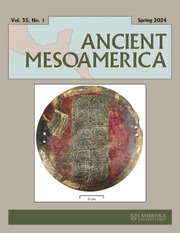Article contents
THE ALTICA PROJECT: REFRAMING THE FORMATIVE BASIN OF MEXICO
Published online by Cambridge University Press: 13 August 2019
Abstract
The Altica Project that began in 2014 is an important step in addressing over two decades of limited problem-oriented research at Formative sites in the Basin of Mexico. Through this research, we demonstrate that Altica is the earliest known settled village in the Teotihuacan Valley and one of the only first-farming village sites in the Basin of Mexico that has not been engulfed by the urban sprawl of Mexico City. It represents the northward spread of settled village life in a time that people of the region were transitioning from a mobile foraging lifestyle to one more reliant on food production. Despite its small size and remote location, Altica was an important part of Early and Middle Formative exchange networks, as it imported multiple types of goods from distant places in Mesoamerica and may have played a role in the early trade of Otumba obsidian. This paper leads the Special Section by framing the research project and outlining its major goals. Survey and excavation results are introduced. Finally, we preface each of the presentations to situate them within the framework. Altica spans a transitional period in Mesoamerica that began around 1000 cal b.c. We establish Altica as a proxy to understand broader Mesoamerican processes at that time.
- Type
- Special Section: Before Teotihuacan—Altica, Exchange, Interactions, and the Origins of Complex Society in the Northeast Basin of Mexico
- Information
- Copyright
- Copyright © Cambridge University Press 2019
References
REFERENCES
- 10
- Cited by


